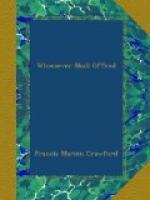The table was set out on the verandah that evening, as usual in spring, and little by little the Professor absorbed the conversation, for they all asked him questions, few of which could be answered shortly. He was one of those profoundly cultivated Italians who are often to be met nowadays, but whose gifts it is not easy to appreciate except in a certain degree of intimacy. They are singularly modest men as a rule, and are by no means those about whom there is the most talk in the world.
The party sat in their places when supper was over, with cloaks and coats thrown over them against the night air, while Kalmon talked of all sorts of things that seemed to have the least possible connection with each other, but which somehow came up quite naturally. He went from the last book on Dante to a new discovery in chemistry, thence to Japanese monks and their beliefs, and came back smiling to the latest development of politics, which led him quite naturally to the newest play, labour and capital, the German Emperor, and the immortality of the soul.
“I believe you know everything!” exclaimed Marcello, with an admiring look. “Or else I know nothing, which is really more probable!” The boy laughed.
“You have not told us about the new form of death yet,” said Aurora, leaning on her elbows and burying her young hands in her auburn hair as she looked across the table at Kalmon.
“You will never sleep again if I tell you about it,” answered the Professor, opening his brown eyes very wide and trying to look terrible, which was quite impossible, because he had such a kindly face. “You do not look frightened at all,” he added, pretending to be disappointed.
“Let me see the thing,” Aurora said. “Perhaps we shall all be frightened.”
“It looks very innocent,” Kalmon answered. “Here it is.”
He took a small leather case from his pocket, opened it, and drew out a short blue glass tube, with a screw top. It contained half a dozen white tablets, apparently just like those in common use for five-grain doses of quinine.
A little murmur of disappointment went around the table. The new form of death looked very commonplace. Corbario was the only one who showed any interest.
“May I see?” he asked, holding out his hand to take the tube.
Kalmon would not give it to him, but held the tube before his eyes under the bright light of the lamp.
“Excuse me,” he said, “but I make it a rule never to let it go out of my hands. You understand, don’t you? If it were passed round, some one might lay it down, it might be forgotten, somebody might take it for something else.”
“Of course,” said Folco, looking intently at the tube, as though he could understand something about the contents by mere inspection. “You are quite right. You should take no risks with such things—especially as they look so innocent!”
He leaned back in his chair again, as if satisfied, and his eyes met the Contessa’s at the same moment. There was no reason why she should not have looked at him just then, but he rested one elbow on the table and shaded his eyes from the light.




